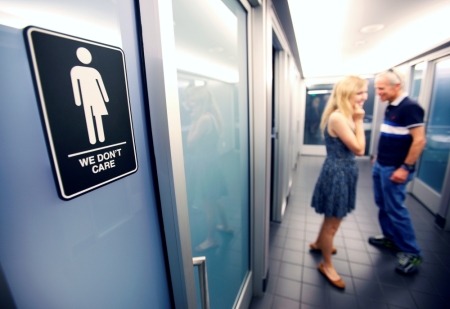Iowa Commission Revises Church Transgender Bathroom Regulations Brochure; Problems Remain, ADF Says

The Iowa Civil Rights Commission revised their online brochure that previously stated transgender bathroom provisions in state law apply to churches when the service is open to the public.
Alliance Defending Freedom praised the move but said problems remain when a government commission is provided the authority to decide which church activities are religious and thus protected by freedom of religion.
ICRC Director Kristin Johnson said Friday that the law never intended to target pastors.
In response to the original wording the Alliance Defending Freedom brought a lawsuit on behalf of Fort Des Moines Church of Christ, arguing that it was an affront on religious liberty.
In a statement Monday, Iowa Governor Terry Branstad praised the revision.
"I think they wanted to clarify the law and make it clear that they have no intention of going after people for exercising their freedom of religion," Branstad said.
Johnson noted that although the Iowa Civil Rights Act includes protections for sexual orientation and gender identity, the "the Iowa Civil Rights Commission has not done anything to suggest it would be enforcing these laws against ministers in the pulpit, and there has been no new publication or statement from the ICRC raising the issue."
"The Commission regrets the confusion caused by the previous publication," she continued.
The brochure's new language changes what "open to the public" and "bona fide religious purpose" mean, the offending language in the original wording.
"Places of worship (e.g. churches, synagogues, mosques, etc.) are generally exempt from the Iowa law's prohibition of discrimination, unless the place of worship engages in non-religious activities which are open to the public. For example, the law may apply to an independent day care or polling place located on the premises of the place of worship," the updated guidelines read.
The previous language stated the provisions apply when a church service is open to the public.
"Where qualifications are not related to a bona fide religious purpose, churches are still subject to the law's provisions. (e.g. a child care facility operated at a church or a church service open to the public)," the former guidelines said.
But attorneys from the Alliance Defending Freedom contend the underlying problem is giving the ICRC the authority to decide which church activities are deemed "religious" in the first place.
In a statement to Caffeinated Thoughts, ADF Legal Counsel Christiana Holcomb said that mere "cosmetic changes" do not address the law's constitutional problems.
"While the commission was right to remove some of the most disturbing language in its brochure, the change in the brochure doesn't fix the inherent problem with the Civil Rights Act that forms the basis of the lawsuit — that the act gives the commission power to determine what parts of a church's activities do not have a 'bona fide religious purpose' and are thereby subject to the act's prohibitions. No state or local law should threaten free speech and the free exercise of religion as protected by the First Amendment." Holcomb said.
The Christian Post reached out to the Alliance Defending Freedom to inquire what it would take to drop the lawsuit but did not receive a response by press time.
Other Iowans share the ADF's concerns but appear willing to accept the changes.
Cary Gordon, senior pastor of Cornerstone World Outreach in Sioux City, whose church also filed suit against the ICRC, said that he accepted the Commission's apology "with clear reservations."
"We will continue to monitor their activities and stand ready to defend all churches at any time." Gordon said.
According to the Des Moines Register, First Liberty Institute attorney Chelsey Youman, who represents the church, said that she is "taking the state at its word that it will not encroach on the church in any way," adding that "if it does in the future, we stand ready to use the full force of the law to protect the church's free exercise of religion and free speech under the Constitution."





















